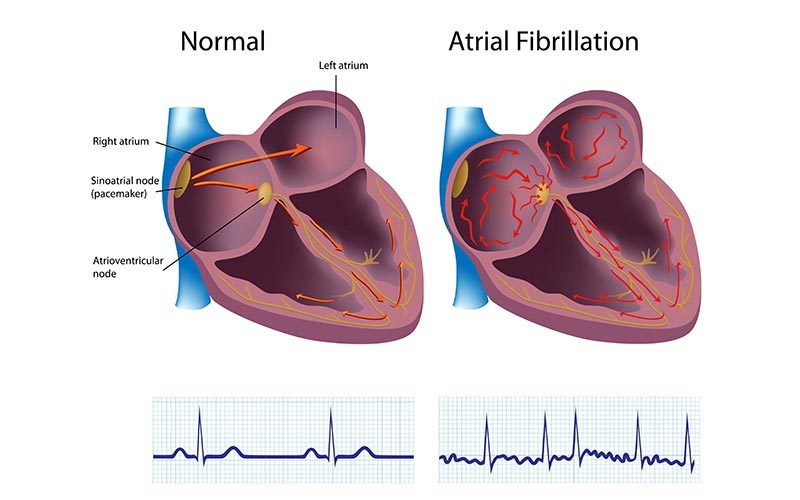The electrical wiring of your heart is one of the most sophisticated pieces of nature’s engineering. In that wiring irregularities can sometimes occur. Arrhythmias are conditions in which a heart beats irregularly, and they can pose serious health concerns. Some arrhythmias and some drugs used to treat serious arrhythmias can present absolute contraindications to diving. With clearance and approval from a qualified healthcare provider however, some patients with specific types of arrhythmias can dive safely. As a diver it is crucial for you to have an awareness of arrhythmias and their effects on your safety. Here’s an introduction to common arrhythmias and how they affect fitness to dive.
Atrial Fibrillation

Atrial fibrillation (or AFib) is the most common form of arrhythmia. Presenting as a fast and irregular heartbeat, AFib results from a disturbance of the electrical signals that make the heart contract in a controlled rhythm. In addition, AFib can cause blood to pool in the atria, promoting the formation of blood clots, and increasing the risk of a stroke. Common causes of the condition are hypertension and coronary artery disease. While some individuals may never experience AFib symptoms despite its presence, individuals with atrial fibrillation should seek qualified medical evaluation. Individuals who experience recurring episodes of AFib should refrain from further diving, as well as individuals on certain medications that can be used to treat AFib.
Extrasystole
Extrasystole is a condition in which heart beats occur outside of the heart’s regular rhythm. These beats are known as “extrasystoles” and often arise in the ventricles. Extrasystoles that do occur in the ventricles are referred to as “premature ventricular contractions” or PVCs. Studies have found that, when monitored for at least 24 hours, as many as 75 percent of healthy individuals have occasional PVCs. An extrasystole like a PVC is not generally felt, but it is followed by a pause as the heart’s electrical system resets itself. The beat following the pause is generally more forceful than a normal beat, and can be felt as a palpitation. Divers who experience PVCs should consult their physician. Most divers with benign PVC may be able to return to diving after a thorough evaluation by a cardiologist.
Syncope
Syncope is an abrupt loss of consciousness, followed by a relatively quick recovery. The causes of syncope range from the relatively benign to the life-threatening. Because of the potential for loss of consciousness in, or around the water, syncope presents specific challenges to divers and aquatic staff. The condition can occur in, or upon exiting the water due to factors such as exertion, dehydration, and the normal return of blood volume to the extremities. Placing syncopal patients flat on their back in a cool environment may quickly restore them to consciousness. While being evaluated for syncope, it is recommended that divers refrain from getting in the water entirely. They may be cleared for diving at the discretion of their physician after the underlying causes of the symptoms have been identified and addressed.
For more information on heart health and diving, read The Heart & Diving.